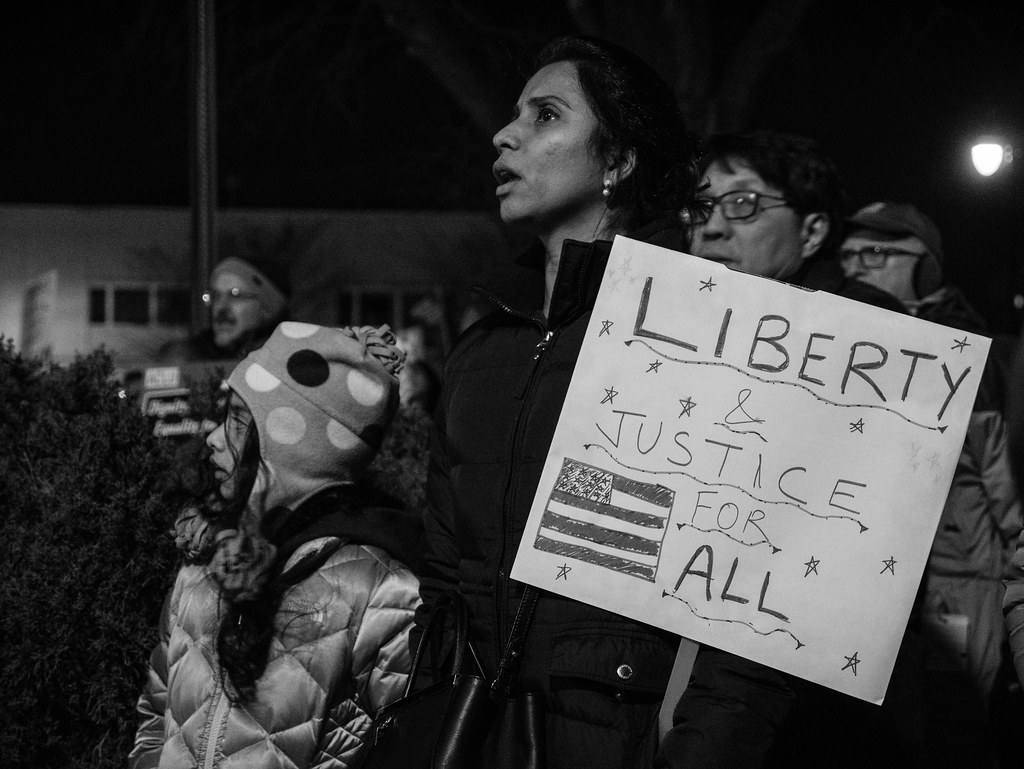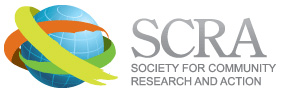Written by Sara L. Buckingham, Regina Day Langhout, Dana Rusch, Tara Mehta, Noé Rubén Chávez, Charles R. Drew, Kevin Ferreira van Leer, Ashmeet Oberoi, Monica Indart, Virginia Paloma, V. Elizabeth King, and Brad Olson and reprinted from The Community Psychologist Volume 54, Number 3, Summer 2021
This piece further explains the Policy Statement.
Many immigrants experience oppression in their communities. Oppression occurs as those with more power exercise dominance over those with less (Prilleltensky, 2003). Oppression is woven into norms and dominant narratives in organizations and institutions (Shpungin et al., 2011), and is revealed through laws, customs, and practices (Kelly & Varghese, 2018). Immigrants resist oppression by taking actions that undermine oppressive power structures. Resistance can be undertaken individually or collectively; targeted at individuals, groups, policies, structures, or systems; active or passive, organized or unorganized, and overt or covert. For example, immigrants might resist by forming counterspaces where they can develop a sense of community with one another and heal from their daily experiences of oppression. They may live in ways aligned with their beliefs and values in spite of demands for assimilation. They may create movements, organize rallies, and participate in acts of civil disobedience.
The Immigrant Justice Interest Group examined how settings can support immigrants’ resistance to oppression. We grounded our literature review in diverse frameworks: A social settings framework posits that settings can take a systems-level approach to social change, attempting to change policies, role relationships, power imbalances, and/or their direction (Seidman & Tseng, 2011). Empowering settings can support social change through their culture of growth and community building, opportunities to take on meaningful roles, peer-based support, and shared leadership (Maton, 2008). A healing justice framework was created by mostly Black feminist and radical organizers in response to Hurricane Katrina to address ongoing harm perpetrated on Black, Indigenous, and communities of Color (Page, 2013); it focuses on liberation and calls for structural solutions while attending to suffering in a cycle where people build community, develop vision, heal, and act (Ginwright, 2018). Decolonization involves decentering western ways of knowing to resurface truths, attending to intersectionality and allyship to resist colonialism (Maldonado-Torres, 2016; Tuck & Yang, 2012).
One type of setting we explored is education. Given that many of us are embedded in colleges and universities, in this column we describe ways higher education may facilitate resistance to oppression and make recommendations we can employ in our institutions. While at their best colleges and universities should serve as empowering settings that support students to grow and develop, to raise awareness of injustice, and to catalyze change, too often systems of higher education in the U.S. marginalize immigrant students and serve to assimilate students to white, Euro-American cultures. Higher education can play a critical role in facilitating resistance by aiming to dismantle oppression inside and outside of academe.
Higher education can provide empowering spaces that help students develop courageous vision, foster their growth and action, and attend to their suffering caused by oppression. Some departments and programs have counterspaces in both their curricular and co-curricular arms, developed by and for immigrants to find a sense of community with one another and heal from their daily experiences of oppression (Case & Hunter, 2012; Pérez Huber & Cueva, 2012). Such counterspaces allow for immigrant students to give and receive social support; learn critical information and develop skills needed to navigate oppressive spaces, including within the college/university itself; learn how to challenge dominant deficit narratives and oppressive structures; and both gain and maintain cultural resources and assets. Curriculum can facilitate resistance by decentering western ways of knowing (Maldonado-Torres, 2016). For example, programs may utilize pedagogical strategies, such as popular education, that center immigrant students’ everyday experiences. Such strategies have students critically analyze experiences to facilitate learning and social change. Further, colleges and universities present opportunities for solidarity with immigrant and non-immigrant peers who are also facing oppression.
Those of us in academe must attend to systems of oppression within and around our higher education institutions, and advocate for systemic and intersecting solutions. To create opportunities for resistance and system transformation, our students should have opportunities to take on meaningful roles, provide and receive support, develop skills, share leadership, and build community. Our institutions can create and allocate resources to facilitate resistance, both within and outside of the institutions. Universities can go beyond internal work to connect with families and communities, transmitting key information, supporting community development, and shaping the space in ways that facilitate resistance (Yoshikawa, 2011).
Different educational institutions may take divergent approaches; there is no one way to support resistance. Although not an exhaustive list, below we provide ways to get started:
RECOGNIZE OPPRESSION: Oppression is carried out individually, collectively, institutionally, and structurally. It can be disguised as the status quo. Therefore, we must stay alert, listen, and look for oppression.
LOOK FOR RESISTANCE: Some resistance may be easier to see than others. We must stay alert to resistance already taking place in our colleges and universities, as well as the surrounding community, to support resistance efforts.
LISTEN AND LEARN: We must look to those resisting within and outside an institution to identify how we might best facilitate resistance and institutional change. We must center the knowledge, experience, skills, and hopes of those engaged in resistance to determine next steps.
LOOK TO MODELS: We should look at educational institutions similar to ours to explore how they have facilitated resistance and institutional change. We must keep in mind that no educational institution is perfect and all are developing.
PROVIDE RESOURCES: Our institutions can support resistance by providing resources our students need. We can build on existing assets and skills of those in institutions, particularly those experiencing oppression. We can think about the unique resources we can offer in our roles as faculty, staff, students, or administrators. These may include legal aid, housing, or health care; education or skills development; technical or fiscal support; and/or emotional and social support.
USE POWER WISELY: We must recognize and use the unique power and strengths our colleges and universities hold to work toward dismantling oppressive systems. We can use curriculum, programming, and structures to facilitate resistance.
MAKE SPACE: We must make sure all voices are heard and their existing knowledge, experiences, and skills are harnessed and valued. We should decenter western ways of knowing and challenge structures of white supremacy. We must make space for those often ignored.
HONOR DIVERSE ROLES: Our institutions must provide opportunities for all members to take on meaningful roles, to share leadership, and to grow individually and together. We should create ways for members’ contributions to evolve over time. We need to honor and value the diverse roles members undertake, particularly those historically undervalued.
ACT IN SOLIDARITY: Those with more power and privilege in our institutions must be allies, accomplices, and partners to those being oppressed, resisting any narrative that pushes them to be saviors and to see others through a passive victim lens. We should change common individual oppression actions, such as privilege-splaining.
LOOK IN THE MIRROR: We all should reflect on our institution’s structures, processes, and practices to examine ways our institution may be upholding systems of oppression. We must actively work toward dismantling oppression in higher education and ensure we are not reproducing the cycle of oppression.
BE WILLING TO REFLECT AND CHANGE: In our work, we will likely make mistakes. We must be open to feedback from those whose resistance we seek to support. We should continuously reflect on what we are doing and why, and be ready to own our actions and make changes accordingly. When we are “called in” by those who are oppressed, we should view the intervention as an act of love, designed to help us do better.
To learn more, please read the full statement at https://doi.org/10.1002/ajcp.12515.
References:
Case, A. D., & Hunter, C. D. (2012). Counterspaces: A unit of analysis for understanding the role of settings in marginalized individuals’ adaptive responses to oppression. American Journal of Community Psychology, 50(1-2), 257–270. https://doi.org/10.1007/s10464-012-9497-7
Ginwright, S. (2018). The future of healing: Shifting from trauma informed care to healing centered engagement. Kinship Carers Victoria. http://kinshipcarersvictoria.org/wp-content/uploads/2018/08/OP-Ginwright-S-2018-Future-of-healing-care.pdf
Kelly, D. C., & Varghese, R. (2018). Four contexts of institutional oppression: Examining the experiences of Blacks in education, criminal justice and child welfare. Journal of Human Behavior in the Social Environment, 28(7), 874–888. https://doi.org/10.1080/10911359.2018.1466751
Maldonado-Torres, N. (2016). Outline of ten theses on coloniality and decoloniality. Foundation Frantz Fanon. https://fondation-frantzfanon.com/wp-content/uploads/2018/10/maldonado-torres_outline_of_ten_theses-10.23.16.pdf
Maton, K. I. (2008). Empowering community settings: Agents of individual development, community betterment, and positive social change. American Journal of Community Psychology, 41(1-2), 4–21. https://doi.org/10.1007/s10464-007-9148-6
Page, C. (2013). Kindred collective: Cara Page. Healing Collective Trauma. http://www.healingcollectivetrauma.com/cara-page.html
Pérez Huber, L., & Cueva, B. M. (2012). Chicana/Latina testimonios on effects and responses to microaggressions. Equity & Excellence in Education, 45(3), 392–410. https://doi.org/10.1080/10665684.2012.698193
Prilleltensky, I. (2003). Understanding, resisting, and overcoming oppression: Toward psychopolitical validity. American Journal of Community Psychology, 31(1–2), 195–201. https://doi.org/10.1023/A:1023043108210
Seidman, E., & Tseng, V. (2011). Changing social settings: A framework for action. In M. S. Aber, K. I. Maton & E. Seidman (Eds.), Empowering settings and voices for social change; empowering settings and voices for social change (pp. 12-37). Oxford University Press.
Shpungin, E., Allen, N., Loomis, C., & DelloStritto, M. E. (2012). Keeping the spirit alive: Using feminist methodology to address silencing as a structural issue. Journal of Community Psychology, 40(1), 44–61. https://doi.org/10.1002/jcop.20481
Tuck, E., & Yang, K. W. (2012). Decolonization is not a metaphor. Decolonization: Indigeneity, Education & Society, 1(1), 1–40.



